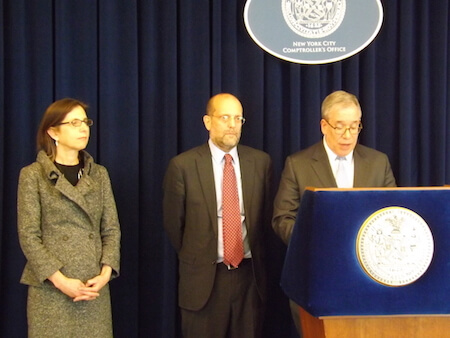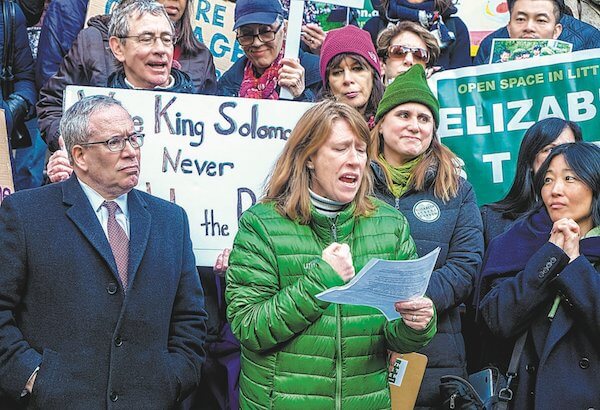BY DUNCAN OSBORNE | An audit of the city’s HIV/ AIDS Services Administration (HASA) found that the agency was not effectively monitoring and inspecting its housing contractors and, in the case of 32 vendors, had not even contracted for housing services, but simply signed a memorandum of understanding (MOU) with them.
“[The Human Resources Administration] wasn’t able to monitor contract compliance effectively,” said Scott Stringer, the city comptroller, during the January 7 release of the audit. “We uncovered a lot of lax oversight… Without critical input and checks and balances, HRA had no way of knowing if services were being delivered to the right people at the right time.”
HASA is the HRA unit that delivers rental assistance, food stamps, transportation assistance, and other benefits to people with AIDS. The agency currently serves roughly 32,000 people with AIDS and another 10,700 of their family members. HASA’s performance has been the subject of complaints from clients and AIDS groups for decades.
Stringer joined by de Blasio’s Human Resources Administration chief in presenting findings
The audit, which reviewed a sample of housing contracts from July of 2012 through April of 2014, found that HASA had entered into a staggering 170 contracts with 61 vendors who were supplying 5,600 units of permanent and emergency housing. HASA signed 43 MOUs with 32 vendors who did not hold contracts. Those MOUs were never reviewed and approved by the city comptroller’s office, as all city contracts must be.
“For many years there had been a practice of having MOUs, but not contracts, and that brought with that a lack of accountability,” said Steven Banks, HRA’s commissioner, at the press conference. “It wasn’t that there were MOUs and contracts, there were only MOUs.”
The audit also found that HASA was not making required inspections of the housing the contractors were providing and that HASA’s systems provided incomplete and sometimes erroneous data on when inspections were made, if they were made at all, and the inspection results were not shared with vendors. In one example of poor recordkeeping, HASA continued to pay the rent for 23 deceased clients during one three-month period.
HASA was repeatedly attacked by the Giuliani and Bloomberg administrations, which saw the agency as little more than another entitlement program. Both mayors tried to reduce HASA services or eliminate the agency entirely.
Typically, mayors react poorly to comptroller audits. That Banks was at the press conference while Stringer pointed out how his agency has failed indicates the extent to which the de Blasio administration and Stringer’s goals are more aligned. Banks said his agency had adopted 15 of 17 recommendations made in the audit and had already started on some changes of its own.
“Principally, the audit and our own reform efforts show that we needed to consolidate contract management for HASA contracts and other contracts in a newly created part of the agency,” Banks said.
“The larger point here is that with Steve Banks we didn’t have to wait until a crisis happened,” Stringer said. “He inherited one of the largest bureaucracies in the city, and he has implemented a reform agenda.”
HASA will now have a master contractor that will oversee all housing contracts there. The city’s health department uses Public Health Solutions as the master contractor for all its HIV prevention contracts and some other HIV contracts funded with federal dollars. That system has worked effectively and has even led to complaints from AIDS groups about the amount of data they have to turn over to the private master contractor.
HASA has a role to play in New York’s Plan to End AIDS, which aims to reduce new HIV infections from the current roughly 3,000 a year in the state to 750 annually by 2020. The plan will use various anti-HIV drug regimens to keep HIV-negative people uninfected and it will get HIV-positive into treatment so they are no longer infectious. AIDS groups have long said that stable housing, nutrition, and transportation services are necessary to keep people on their HIV medication, and some data supports that view.
Since its inception, HASA has only accepted people with an AIDS diagnosis as clients. As powerful anti-HIV drugs have gained widespread use, few HIV-positive people have progressed to an AIDS diagnosis. Without HASA assistance, a subset of HIV-positive people who are poor and perhaps homeless can struggle to stay on their medications.
On December 1, Mayor Bill de Blasio endorsed city legislation titled HASA For All that would allow HIV-positive people without an AIDS diagnosis who qualify financially to access HASA services. AIDS groups have sought that legislation since it was introduced in the City Council in 2007. Since the state contributes to HASA funding, City Hall, AIDS groups, and the Cuomo administration are currently negotiating how the cost of increasing HASA access will be split.
The audit and ensuing reforms will help that process, Banks said.
“We can be comfortable that the structures will be in place to insure that services are delivered in the way that they should be to clients who need housing,” he said. “The expansion of HASA services in terms of housing, nutrition, transportation is in the state budget process. We’re going to work with all our partners in Albany.





































